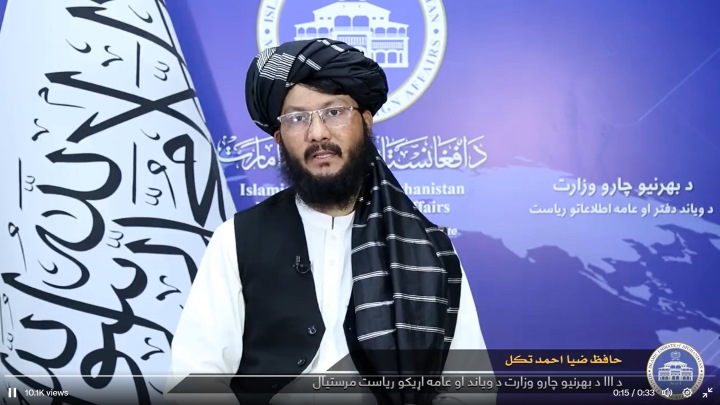

Taliban spokesperson advises Pakistanis on regional stability (Screengrab: @khorasandiary/Twitter)
The Taliban government in Afghanistan has expressed its dismay at the civil war-like situation in neighbouring Pakistan. The two Islamic nations share a 2,640-km long boundary known as the Durand line with communities having close ties on both sides of the shared border.
In a video release, the Ministry of Foreign Affairs (MoFA) of the Afghan Interim government expressed its concerns at the poor state of affairs in Pakistan and said that political stability in Pakistan is important for Afghanistan and the entire region. The spokesperson urged all stakeholders in the country to observe tolerance and understanding in the current situation.
The video statement said that the ministry has given instructions to its diplomatic missions in Pakistan to take all measures to ensure the safety and protection of Afghan nationals in Pakistan.
In a statement posted on its website on Wednesday, the MoFA said: “The Islamic Emirate of Afghanistan is saddened by the recent events in Pakistan, leading to large-scale protests and even violence in some instances. The Islamic Emirate of Afghanistan considers political stability in Pakistan in the interest of the Muslim people of Pakistan and the broader region, and hopes the sides demonstrate restraint and understanding”.
On May 9, former Pakistani prime minister Imran Khan was arrested on Tuesday afternoon by Pakistani paramilitary forces from the Islamabad High Court. Khan’s arbitrary arrest led to severe violence as his supporters attacked Pakistani Army installations at Rawalpindi, Lahore, Peshawar and Quetta including the residences of corps commanders. The unprecedented rioting brought all of Pakistan to a standstill.
Afghanistan is naturally worried as it had barely days before the civil unrest in Pakistan participated in the China-Afghanistan-Pakistan Foreign Ministers’ trilateral in Islamabad on May 6. Afghanistan’s Acting Foreign Minister Amir Khan Muttaqi had been given special permission by the UN to attend this meeting.
For the Taliban government, the trilateral had meant investments from China as well as international recognition that it has been seeking. The three nations had discussed peace, stability and reconstruction for Afghanistan along with the need to revive the Afghan economy that stands on the verge of collapse under the current regime.
Afghanistan is worried that the severe unrest in Pakistan will have a bearing on Afghanistan at a time when it is looking at economic revival through China. The Taliban government has also been exploring the possibility of making Afghanistan a centre for regional connectivity linking South Asia to the Central Asian Region (CAR) as well as linking up with China as well.
A politically unstable and economically unviable Pakistan, where the masses have led a revolt against their own army has consequences for the Taliban government. The Talibs realise it and would, therefore, want Pakistan to quieten down as soon as possible.
Also read: Is Pakistan smuggling food to Afghanistan despite hunger pangs at home?
Union Minister of Coal and Mines G Kishan Reddy on Tuesday held an inter-ministerial meeting…
India's largest automobile in-plant railway siding at Maruti Suzuki's Manesar facility started operation on Tuesday,…
Google on Tuesday unveiled its Safety Charter for India's AI-led transformation, at the "Safer with…
The human rights organisation of the Baloch National Movement (BNM), Paank, has published its most…
The Israel Defence Forces (IDF) on Tuesday claimed that it has killed Iran's senior-most military…
Amid escalating conflict between Iran and Israel, the Ministry of External Affairs (MEA) on Tuesday…